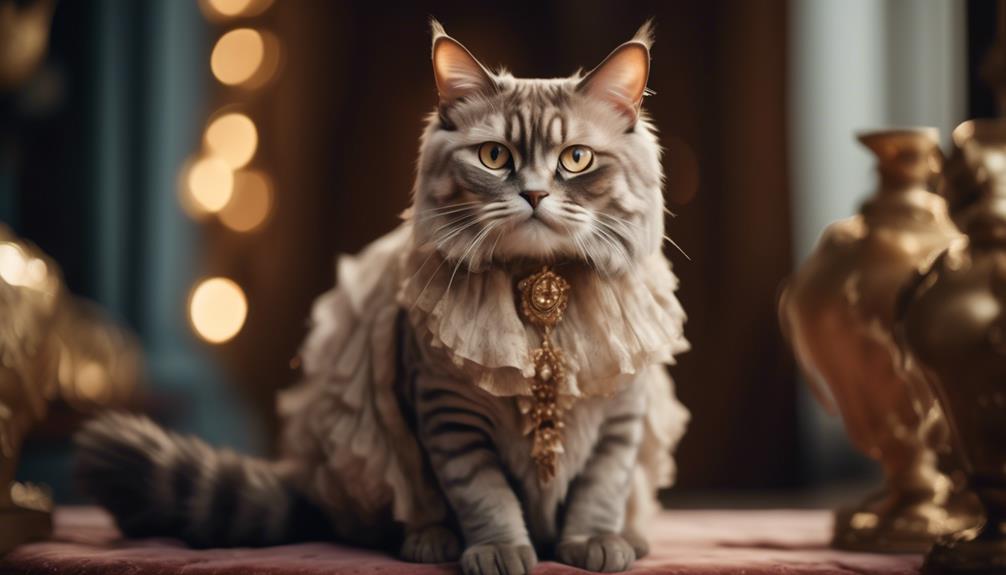
The Donskoy cat breed is an intriguing subject, as it offers a unique combination of characteristics that set it apart from other feline breeds.
Originating in Russia, these cats are known for their hairlessness, which may pique the curiosity of many cat enthusiasts.
However, there is much more to the Donskoy than just their lack of fur.
Their warm and soft skin, coupled with their friendly and sociable nature, make them an interesting option for those seeking a visually and emotionally appealing companion.
Furthermore, their trainability and grooming requirements add another layer of complexity to understanding this breed.
So, let us embark on a journey to unravel the various facets of the Donskoy cat breed and discover what makes them truly captivating.
Key Takeaways
- The Donskoy cat breed originated in Russia and is known for its hairlessness, which is a dominant trait.
- Donskoys are friendly and pleasant and form strong bonds with humans, making them well-suited for households with human interaction.
- They have moderate to high exercise needs and are easy to train, enjoying learning tricks.
- Grooming requirements vary depending on the coat type, with regular bathing and moisturizing often necessary for the hairless varieties. Regular vet checkups are important for their overall health and well-being.
Origin and Size
The Donskoy cat breed, also known as the Don Sphynx or Donskoy originated in Russia and is known for its unique hairless or semi-hairless appearance.
These medium-sized cats typically weigh between 6 to 15 pounds.
Belonging to the hairless/semi-hairless breed group, Donskoys have a lifespan of 12 to 15 years.
Their coats vary, from completely hairless to flocked, velour, brushed, or straight.
Donskoys are highly intelligent, playful, affectionate, loyal, and social cats.
They require moderate to high exercise and are easy to train.
Grooming depends on the coat type, with regular bathing and moisturizing often necessary.
While generally healthy, Donskoys may be prone to genetic health conditions like hypertrophic cardiomyopathy (HCM).
It’s important to note that Donskoys lack whiskers, and there are four types of Donskoys: Rubber Bald, Flocked, Velour, and Brush.
See another cat breed profile.
Egyptian Mau Cat Breed
Breed Group and Lifespan
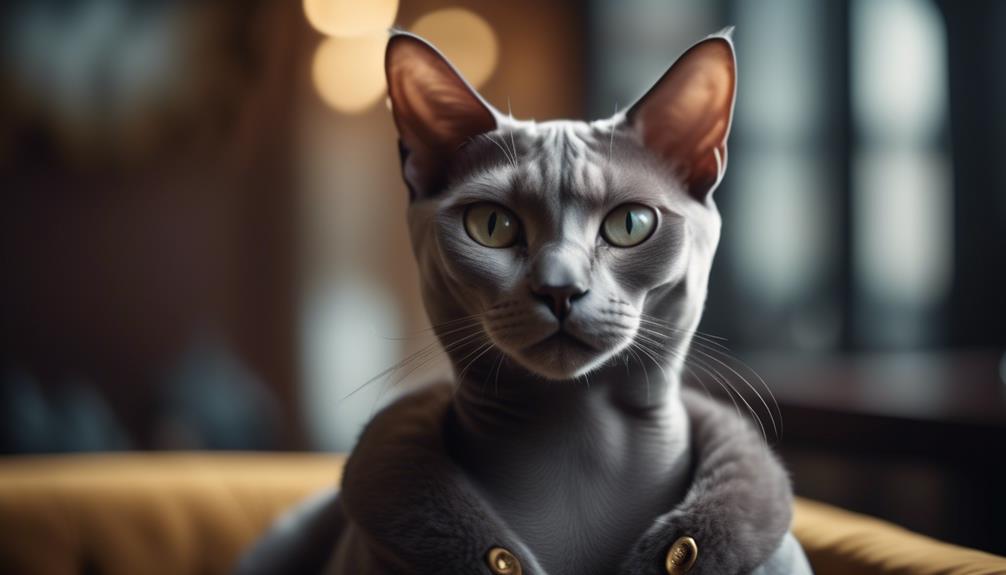
The Donskoy cat breed belongs to the hairless/semi-hairless breed group and typically has a lifespan of 12 to 15 years.
These cats are known for their unique hairlessness, a distinguishing feature of the breed.
They have warm and soft skin to the touch.
Donskoys are friendly and pleasant, forming strong bonds with humans.
They have an interactive and playful personality, requiring attention and affection.
This breed is well-suited for households with human interaction.
Donskoys have moderate to high exercise needs and are easy to train, enjoying learning tricks.
Grooming requirements vary depending on the coat type, which can be hairless, flocked, velour, or brushed.
Regular bathing and moisturizing may be necessary for proper care.
Donskoys are generally healthy cats, but regular vet visits are important to ensure their well-being.
Coat and Temperament
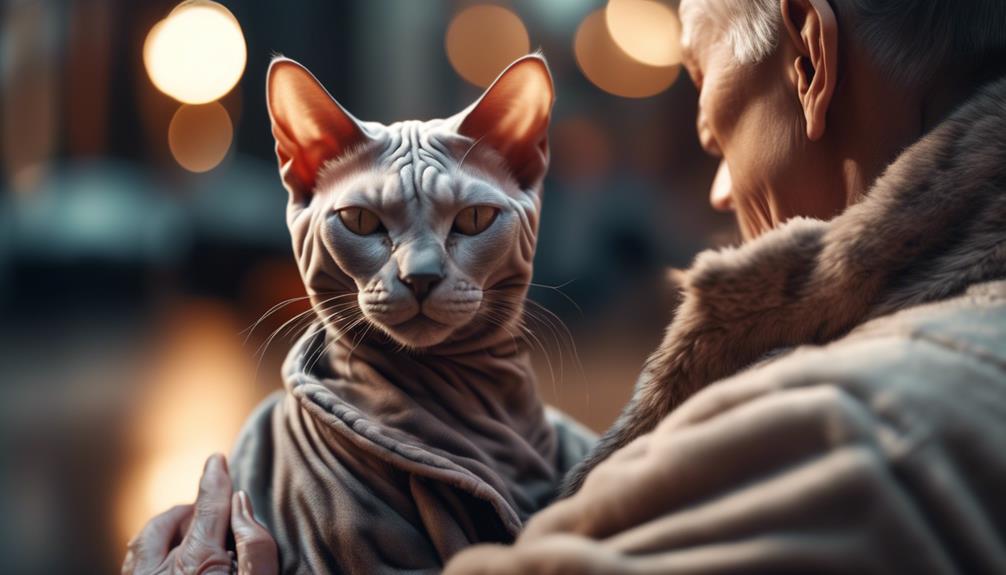
Moving on to the coat and temperament of the Donskoy cat breed, their unique hairlessness is complemented by their distinct personality traits.
The coat of a Donskoy can vary from being completely hairless to having a flocked, velour, or brush-like texture. Despite their lack of fur, their warm and soft skin is pleasant.
Regarding temperament, Donskoys are known for being friendly, pleasant, and interactive.
They form strong bonds with their human companions and require attention and affection.
These cats are also playful and intelligent, making them easy to train and enjoy learning tricks.
Their moderate to high exercise needs make them well-suited for households with plenty of human interaction.
Exercise Needs and Training
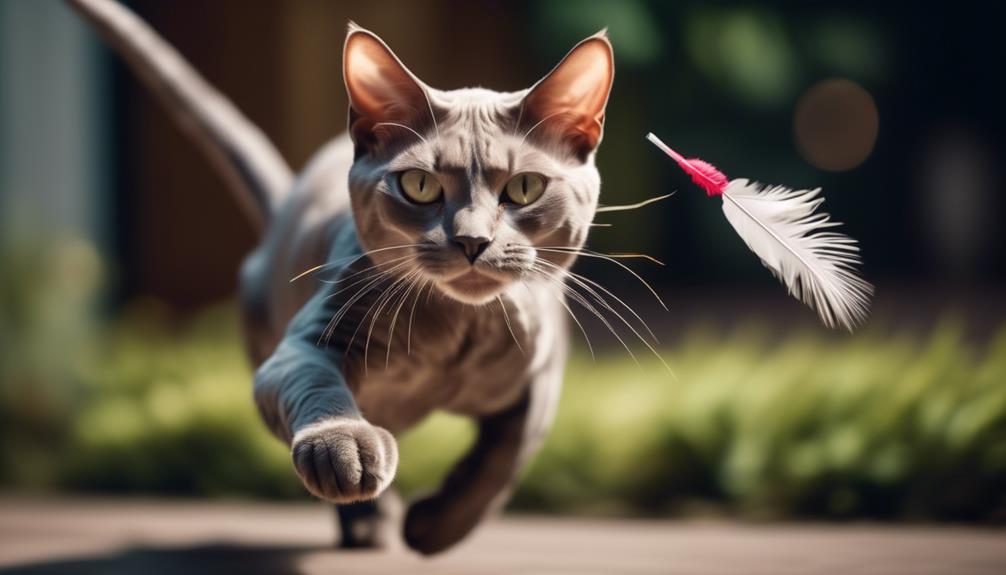
What are the exercise needs and training requirements of the Donskoy cat breed?
The Donskoy cat breed has moderate to high exercise needs.
They are an active breed that enjoys interactive playtime and mental stimulation.
Engaging them in daily play sessions with interactive toys or puzzle games can help meet their exercise requirements and keep them mentally stimulated.
In terms of training, Donskoys are known to be easy to train and enjoy learning tricks.
Positive reinforcement techniques, such as treats and praise, work well with them.
They are intelligent cats and quickly understand commands. Consistency and patience are key when training Donskoys.
Donskoys can lead a happy and well-adjusted life with proper exercise and training.
Grooming and Health
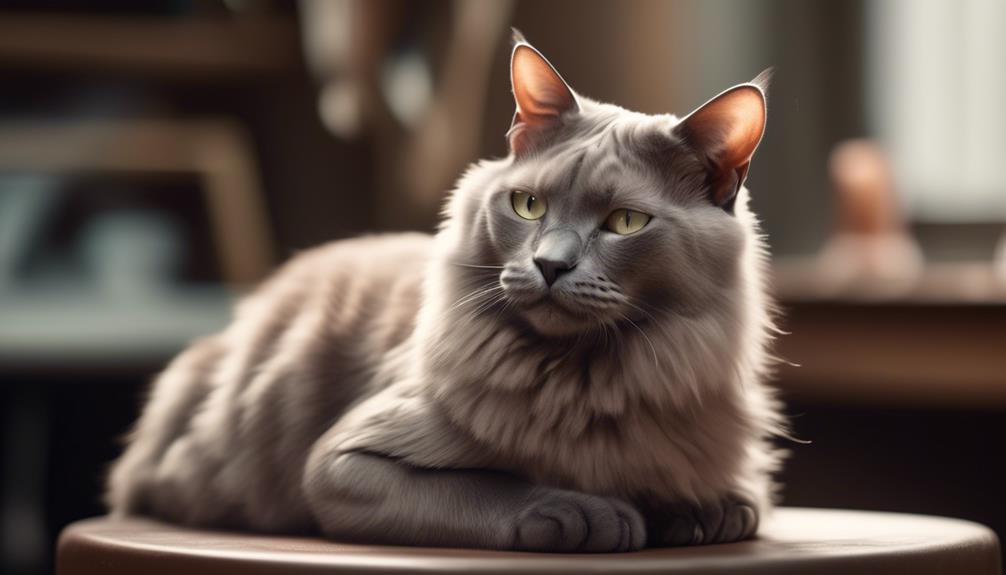
Grooming and health are important aspects to consider when caring for a Donskoy cat.
To ensure the well-being of your furry friend, here are some key points to keep in mind:
Grooming:
- Donskoys have different coat types, including rubber bald, flocked, velour, and brush. Each requires a specific grooming routine.
- Regular wiping is necessary to remove oils from the skin, and bathing should ideally be done once a week.
- Due to their hairless nature, Donskoys are susceptible to sunburn, so protecting them from extreme temperatures is crucial.
Health:
- While generally healthy, regular veterinary checkups are important to monitor their overall health.
- Donskoys may experience skin issues for various reasons, so keeping an eye on their skin condition is crucial.
- Dental problems, such as plaque buildup and gingivitis, are common, emphasizing the need for regular teeth brushing and dental care.
Frequently Asked Questions
Are Donskoy Cats Hypoallergenic?
Donskoy cats are generally considered hypoallergenic due to their hairlessness.
However, individual reactions to cat allergies can vary, so spending time with a Donskoy cat is recommended before making a decision.
Can Donskoy Cats Be Kept as Outdoor Cats?
Donskoy cats can be kept as outdoor cats, but caution should be exercised.
Their lack of fur makes them vulnerable to sunburn and extreme temperatures.
Regular veterinary checkups and protection from the elements are essential for their well-being.
How Do Donskoy Cats Handle Being Alone for Extended Periods?
Donskoy cats may not handle being alone for extended periods well.
They are social animals that form strong bonds with their humans and require attention and affection.
Providing companionship or considering alternative arrangements when leaving them alone is recommended.
Do Donskoy Cats Get Along Well With Other Pets?
Donskoy cats typically get along well with other pets when properly introduced and socialized.
Their friendly and sociable nature allows them to form strong bonds with humans and animals, making them well-suited for households with multiple pets.
Are Donskoy Cats Prone to Obesity?
Donskoy cats are not particularly prone to obesity.
However, like any cat, their weight can be influenced by diet and exercise.
It is important to provide them with a balanced diet and engage them in regular physical activity to maintain a healthy weight.
Conclusion
In conclusion, the Donskoy cat breed is a fascinating and unique one from Russia.
With their distinctive hairlessness and friendly nature, Donskoys make wonderful companions for those who can provide them with attention and affection.
They are highly trainable and enjoy learning tricks, and their grooming requirements vary depending on their coat type.
While generally healthy, it is important to prioritize adopting from reputable sources and ensuring regular veterinary checkups and sun protection for their well-being.




